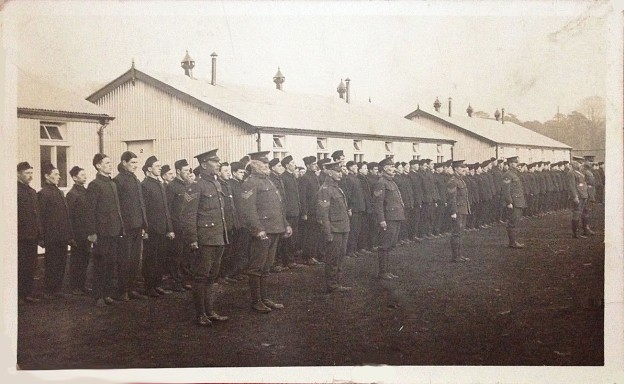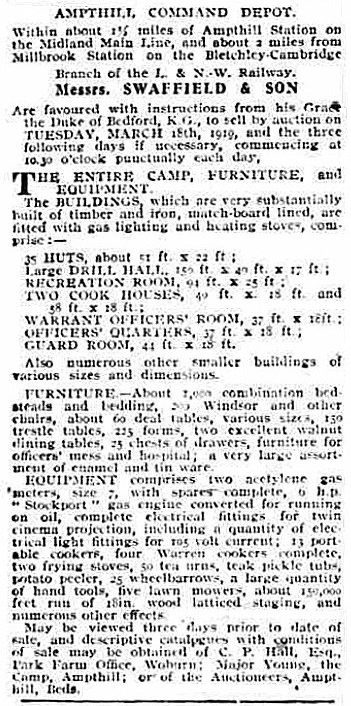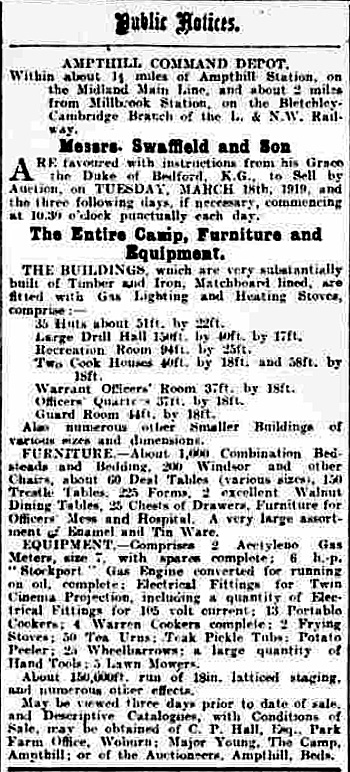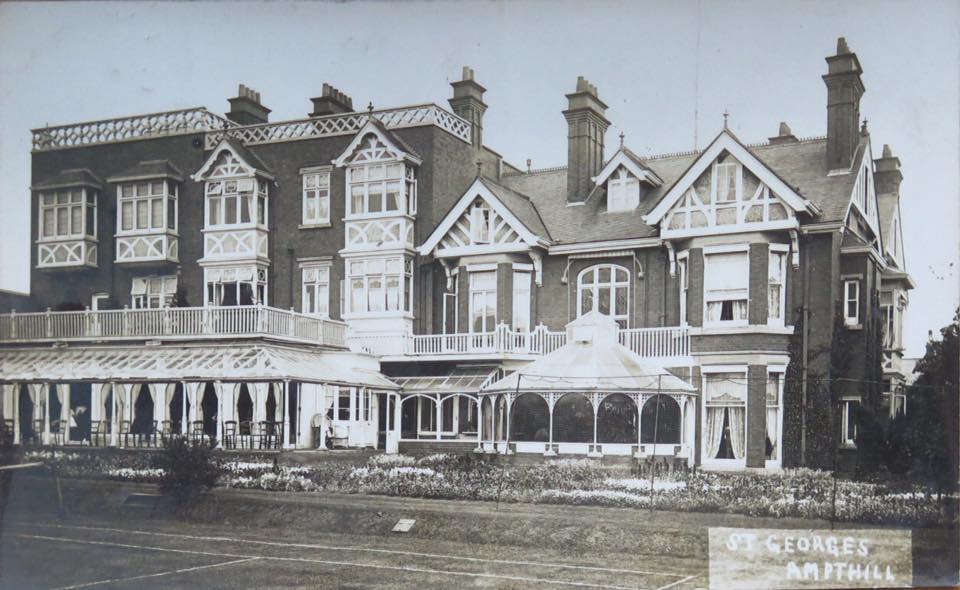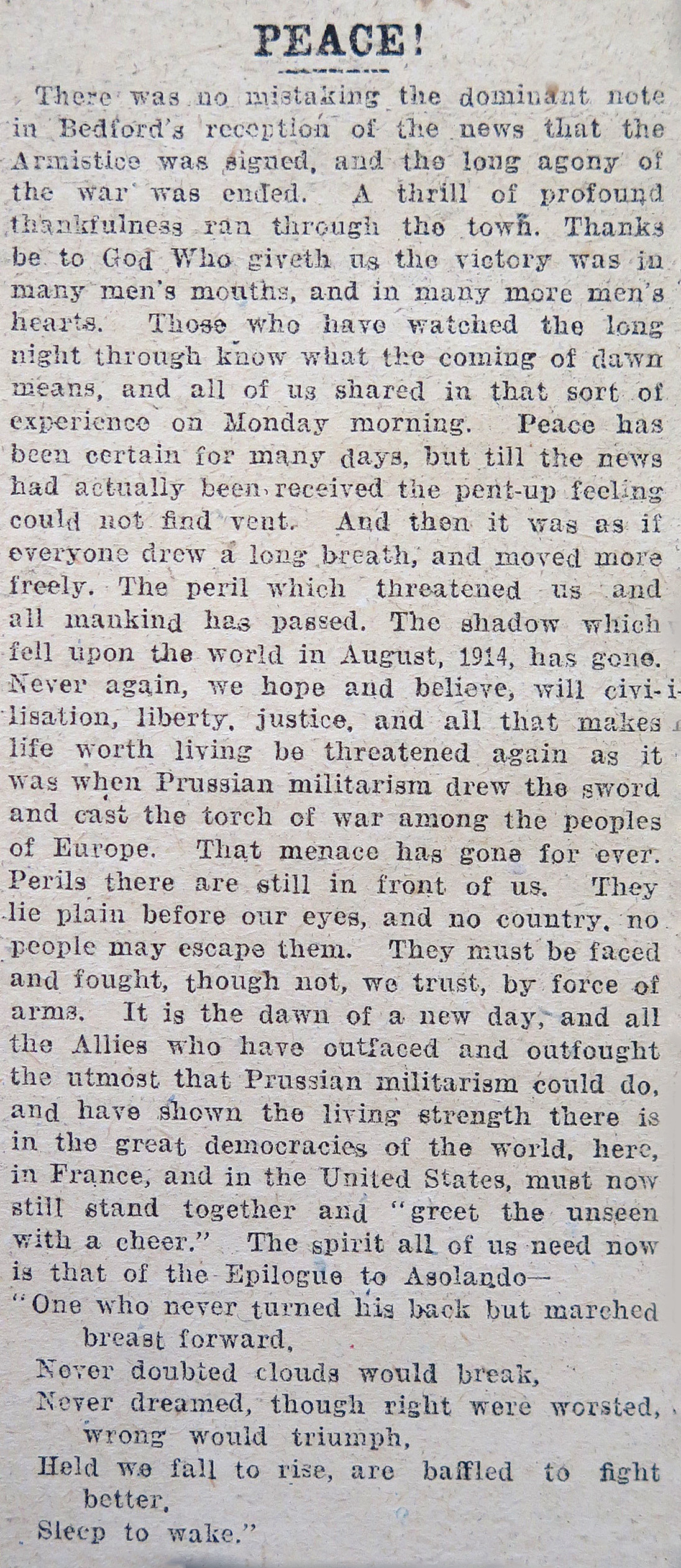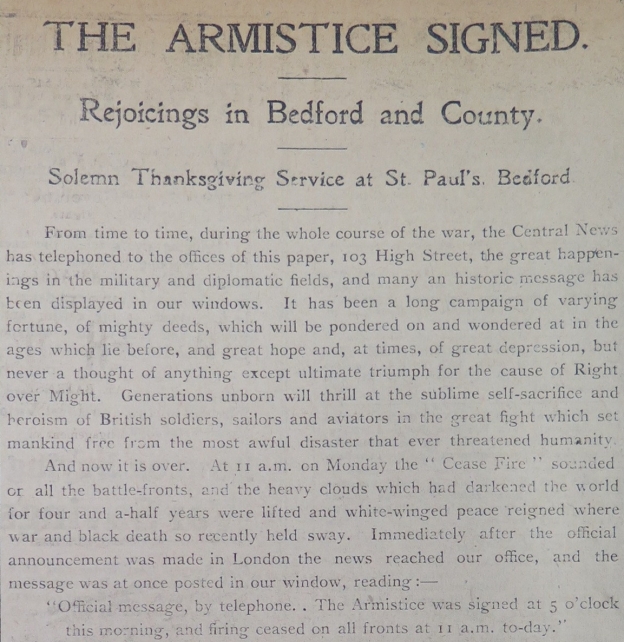THE ARMISTICE SIGNED
————–
Rejoicings in Bedford and County
————–
Solemn Thanksgiving Service at St. Paul’s Bedford
————–
From time to time, during the whole course of the war, the Central News has telephoned to the offices of this paper, 103 High Street, the great happenings in the military and diplomatic fields, and many an historic message has been displayed on our windows. It has been a long campaign of varying fortune, of mighty deeds, which will pondered on and wondered at in the ages that lie before, and great hope and, at times, of great depression, but never a thought of anything except ultimate triumph for the cause of Right over Might. Generations unborn will thrill at the sublime self-sacrifice and heroism of British soldiers, sailors and aviators in the great fight that set mankind free from the most awful disaster that ever threatened humanity.
And now it is over. At 11 a.m. on Monday the “Cease Fire” sounded on all the battle-fronts, and heavy clouds which had darkened the world for four and a-half years were lifted and white-winged peace reined where war and black death so recently held sway. Immediately after the official announcement was made in London the news reached our office, and the message was posted in our window, reading:-
“Official message, by telephone. The Armistice was signed at 5 o’clock this morning, and firing ceased on all fronts at 11 a.m. to-day.”
Immediately afterwards, flags were flying all over town, the church bells rang out merry peals, and most of the factories closed down. Soldiers were heartily cheered in the streets, and jubilant crowds marched through the principal thoroughfares. At 2.30 a military band paraded the High-street, playing inspiring music. Although the rejoicing was universal there was no attempt at maffiking, and the genera feeling was one of deep thankfulness that the bloodshed and the suffering had temporarily ceased.
As the day wore on the intensity of the general rejoicing became more and more manifest. In every avenue, road, and street flags of every description were flying from the windows, fluttering on the flagstaffs or lines were stretched across the roads, the Tricolour of France flew side by side with the Standard of England, the Stars and Stripes of America, the flags of Italy, Portugal, Canada, Australia, New Zealand, India, Japan, Serbia, Russia, and Roumania, and one wondered where all the banners which went to make up this kaleidoscopic display of colour and beauty came from. But one has only to recall the lines of the Bedford School song to realise it, and to remember that
O north and south, and east and west,
Where’er you roam o’er the worlds wide breast,
You’ll find the lads of the Eagle Crest
From Bedford by the river.
That is the explanation; Bedford’s sons have travelled the world o’er, and the flags that floated triumphantly in all parts of the borough have been brought from foreign lands, and rested in the halls and rooms of Bedford’s people ready to be brought out on the great day. The flags of the Dominions were displayed at 24, Ashburnham-road. Hanging on the front of the Conservative Club were the flags of all the Allies, and streamers were stretched across the road.
Large Streams of People.
From the suburbs poured large streams of people, towards the main thoroughfares, intent on keeping general holiday, and all seemed bent upon reading the glad tidings for themselves, so that hour after hour there was a packed throng round the message in the window of the “Bedfordshire Standard” Office. Deep into the public mind the great news sunk; the spirits of the people, at first subdued in realisation of the fact that the inevitable had happened, that they were standing on the threshold of the dawn of England’s greatest glory, gradually rose as the extent of the triumph revealed itself, and many gave way to rapturous delight, signing, cheering, waving flags, and wearing rosettes and other appropriate favours. The joy of the children, freed from school duties, knew no bounds, and with the miniature instruments of “music” were in great favour, and none stopped to question the quality of the “melodies.”
Band and Bells.
An excellent military band paraded the streets, another played martial airs near the Swan Hotel, and the bells from all the churches rang out merry peals. Freely interspersed with the crowds were khaki-clad British and Colonial soldiers, sturdy land lasses, and uniformed “Queen Mary” girls. The mast and gaff at the Queen’s Engineering Works was gaily decorated with large flags of all the allies, surmounted with a huge Union Jack, and the employees were addressed by Mr W.H. Allen, whose remarks were received with loud cheers. The Recreation Club at the Works had a “joy day” on Wednesday. There was a ladies’ football match on the private recreation ground in the morning, followed in the afternoon by a match by Works and Queen’s Park Rangers, and in the evening a social and dance was held in the ladies’ dining room at the Works.
Flags and Fireworks.
There were many amusing incident, and in the middle of the crowded High-street a party of Colonials swarmed onto the roof of a passing cab, and from that point of vantage waved flags and snag to their hearts’ content, whilst the crowds set up cheery cheers. As the evening drew on, the crowds became still more dense, and the lights of Bedford shone out in direct contrast to the subdued glimmer which had prevailed for three years. The shops were closed, of course, but the great electric arc lights illuminated a never-to-be-forgotten scene. The bang and flash of fireworks recalled a shadowy past, when every public celebration was accompanied by brilliant pyrotechnic displays, and although fireworks were somewhat limited on Monday evening there seemed no limit to these tokens of exuberant spirits on Tuesday night, when the celebrations were continued with more gusto than ever. The fine band of the Salvation Army stood on the Market-place, with the Union jack waving above it, and played grand old British airs, the crowds joining heartily in singing the words of several of these, whilst many in the crowd sang the Marseilles in French to a most admirable rendering by the band.
Thanksgiving Services.
To the various places the devout thronged in large numbers, and the Church of England and Free Church ministers had made special preparations for exceptionally big congregations, but even when the sacred buildings were taxed to their utmost capacity, and crowds, unable to gain admission, swarmed in the entrances and waited till the close, listening to the singing of hymns of thankfulness. All the entrances to St. Paul’s Church were crowded, the throngs reaching up the pathways to the very gates.
During Monday evening the main terms of the armistice were received at our office, and posted in the window. They were recognised as overwhelming evidence of the completeness of the Allie triumph, and the vindication of all for which our bravest and best have fought and died.
St. Paul’s Church, Bedford.
Long before the hour appointed – 8 o’clock – every seat was occupied in St. Paul’s Church, where a thanksgiving service had been arranged to be held on Monday evening. The service was deeply impressive, and it was evident from the demeanour of the people that a congregation with full hearts had assembled in their thankfulness for the termination of the war. As the Town Council and officials, together with the vicar (Canon Speck) and choir, processed up the nave, the National Anthem was sung, and the service opened with the hymn “Rejoice, the Lord is King,” and the heartiness of the singing by the crowded congregation was a marked feature of the service. The special Psalms were the 148th and 150th, and the General Thanksgiving was fervently recited by the whole congregation. The choir, with Dr. Harding at the organ, then gave a fine rendering of the “Hallelujah Chorus.”
The Vicar, the Rev. Canon Speck, who had read the service, then gave a short address from the chancel. His theme, that afternoon would be two words that were spoken in a London Law Court by a judge who, after reading out to the Court the fact that the armistice had been signed, said “Thank God.” Those two words inspired that service, and that congregation, and would, please God, inspire the people right through the days of reconstruction until the final terms of the peace had been arranged. Meanwhile they thanked God for the cessation of hostilities, for the prevention of further bloodshed and loss of life, for the indomitable men and heroic women who had written this glorious and tragic page in the annals of English tradition. They could thank God with the deepest reverence for those whose names were written on the Roll of Honour, who had fought their fight and made the great sacrifice for God and king and country. They thanked God that their prayers had been heard, that the organised forces of unrighteousness and hypocrisy had been laid low, and that the God of righteousness proclaimed His sovereign will among the nations. Day by day their prayers had been offered unceasingly for the restoration to home and fatherland of their dear ones, and they thanked God for answering that prayer. They would now endeavour to show forth their praise not only with their lips, but in their lives, by giving themselves to God’s service.
The choir then sang Te Deum with splendid effect, the setting being Huntley in B flat.
Bedford School Chapel.
A service of thanksgiving was held in the Bedford School Chapel on Tuesday morning, at which all the instructors and School servants, as well as the boys and masters, were present. After the boys were seated the choir entered by the west door, singing the hymn “Praise, my soul, the King of Heaven,” to Goss’s tune, followed by the masters and the headmaster. The order of service was as follows; 1st lesson, Exodus xv., 1-18; psalms cxliv. And cl.; 2nd lesson, Romans viii, 23 and 31 to end; hymn, “Hail the Lord’s Anointed”: versicles and responses and prayers; hymn, “All people that on earth do dwell”; the Blessing; Te Deum Laudamus. The service was, what all services ought to be, and especially on such an occasion, of such a kind that the congregation could take their full share, the hymns being set to well-known tunes of moderate compass, and the Te Deum being sung to a familiar chant. The first lesson was read by the Vice-Master (Mr E.H. Dasent), and the second by the Headmaster. The service lasted a little over half an hour, and the rest of the day was observed as a holiday.
All Saint’s, Queen’s Park.
On Monday evening All Saint’s, Queen’s Park, Bedford was filled with a devout and thankful congregation, when a thanksgiving service was held. The Vicar (the Rev. Ramsey Murray) officiated. The services, which throughout was of an impressive nature, commenced with the rendering on the organ of “The Marseillaise” by Mr Slaughter, the organist, and the hearty singing of the National Anthem by the congregation. The service took the form of shortened evensong, and the hymns sung included the Old Hundredth and “Now thank we all our God.” At the conclusion of the prayers the Vicar read from the chancel steps the names of those on the Roll of Honour of the parish, including those who have made the supreme sacrifice. The service concluded with the signing of a solemn Te Deum.
————–
The glad news of the cessation of hostilities came to Kempston on Monday morning, and very shortly afterwards flags were hoisted from public and private buildings. There was much hearty handshaking and congratulations, and the soldiers billeted in the district and civilians made merry.
Enthusiasm at the Barracks.
The fact that the armistice had been signed became known unofficially at Kempston Barracks between 9 and 10 a.m. Spontaneously the pent-up feelings of a couple of days’ duration on the part of many at the Depot broke loose in an uncertain manner, and some memorable scenes were enacted. Exactly at 11 o’clock a new Union Jack and the black and amber flag of the Bedfordshire Regt. (both of which had been acquired in readiness for the celebration of the event) were hoisted on the tower at the entrance to the Barracks and facing Bedford-road, to the accompaniment of cheers from hundreds of soldiers, the Royal Engineers being at that time on parade in the recreation ground adjoining the Barracks. The troops simultaneously surged onto the barrack square, and with members of the Depot staff continued vociferously cheering for some time, after which three buglers of the Bedf. Regt. Sounded the “Cease Fire, amid tense silence. The crowd then gave way to merriment in no half-hearted manner, and all work at the Depot was suspended. In the various institutions connected with the Barracks there were scenes of greatest rejoicing. Flags were displayed outside the military hospital, and the convalescent patients took their share in the celebration. The Depot band, under the conductorship of Bandmaster Baxter, played selections on the square, a popular sergeant attached to one of the Labour Corps proving himself an accomplished drummer. The troops and members of the N.A.C.B. and Q.M.A.A.C. located at the Barracks had their full share of the enjoyment in the joy of tripping the light fantastic on the square to the accompaniment of the band. Shortly after mid-day the Engineers left Barracks, not in matching style, but a jolly, happy and contented throng. Headed by an N.C.O. with a Union Jack, attached to his rifle and fixed bayonet, and a drummer and a bugler, they marched towards Bedford, singing patriotic songs, a large number of boys and girls, carrying Union Jacks, bringing up the rear. During the morning a large crowd assembled outside the Barrack gates watching the “frolics” of those inside. The pupils of the Garrison School were given a half-day’s holiday, which was greatly appreciated.
Upon receiving the news at Cranfield on Monday at 11 a.m. that an armistice had been signed, the Union Jack was hoisted on the church tower, and the bells were kept ringing during the rest of the day.
News that hostilities were at an end reached the village of Ridgmont early on Monday, and many evidences of excitement and relief were prevalent everywhere.
At Elstow there was much rejoicing and thankfulness when the news of the signing of the armistice was known. Flags appears as if by magic. The flag was hoisted to the church tower, and merry peals were rung throughout the day. At the Parch Church a thanksgiving service was held at 6:30 p.m. The service commenced with the singing of the National Anthem and “Now thank we all our God.” The lesson was taken from the fourth chapter of Phillippians. The followed Te Deum, suitable prayers, and the hymn “Father of all.” The address was given by the vicar and the service was brought to a close by signing hymns “For all the saints who from their labours rest” and “All people who on earth do dwell.” For simplicity and unanimity, and as an expression of deep popular feeling – a people’s thanksgiving – it is impossible to speak too highly.
The first at Biggleswade to receive the news that the armistice had been signed was Colonel French, D.S.O., the O.C. of the local Signal Depot, and before 9:30 a.m. this as well known on Monday morning throughout the town. The good news was received with great joy and much enthusiasm. The Parish Church bells, the fire bell, and several hooters announced the fact, and the Fire Brigade members paraded the town with their steam engine, carrying the Boy Scouts bugle band, who gave the “All Clear” sound in all the streets of the town. A special thanksgiving service was held at 12 o’clock at the Parish Church, which was crowded for the happy occasion. The clergy taking part were the Rev. G.H. Strange, M.A., and the Rev. Douglas Hoole, C.F., and the Rev. R.S. Strong. The hymns included “The old hundredth,” and “O God our help in ages past,” and the National Anthem.
When the news arrived at Potton that the armistice had been signed and the fighting had ceased, people were at first silent with joy, and as the great fact began to dawn upon them and they realised that it was really true, great animation prevailed. Flags appeared from the windows of many houses, and the town soon presented a festive appearance. To instil into the minds of the rising generation the importance of the events which have happened, Mr F.W. Braybrooks J.P., lighted upon the happy idea of giving all the children a tea. No sooner was the idea thought of than it was put into operation, and with the help of a number of ladies the provisions were got together, and through the generosity of Mr and Mrs Braybrooks, all the school children were regaled with tea in the Central Hall. Mr Braybrooks afterwards spoke to the children of the importance of that day, explaining what the armistice meant, and what the great victory would mean to them in days to come. Cheers (such as only children can give) were given for the King and Government, and lastly for the kind and thoughtful host. The National Anthem was sung lastily before dispersing. At 7:30 the Free Churches held a united service in the Congregational Church, which was largely attended. The service was inspiring, and full of praise and thanksgiving to Almighty God for all the mercies and goodness bestowed upon our land and our Allies during the four years of war, culminating in the greatest victory which was being celebrated that day. Touching tribute was also paid to all those who had fallen in the war, with special prayers for the bereaved. The Rev. J. Phelps, Pastor, presided over the service, Mr. Jones (Wesleyan) read the lessons, Captain Smith (Salvation Army), and Mr G. Woodman (Baptist) offered prayer, and the Rev. G. Whelpton (Wesleyan) and Mr F.W Braybrooks, J.P. (Congregational) gave addresses. Suitable hymns were heartily sung, finishing with “God bless our native land,” and the Benediction brought a memorable service to a close.
The joyful news of the signing of the armistice received a hearty welcome in the parish of Moggerhanger on Monday morning. The church and school bells were rung for half an hour, and in the evening a thanksgiving service was held in the Parish Church, which was largely attended. An appropriate sermon was approached by the Vicar.
The welcome news was received at Stevington with every manifestation of thankfulness and joy. The church bells rang merrily throughout Monday, and on Wednesday evening there was a largely attended service of thanksgiving at the Parish Church.
When the news became known a Campton work in most cases was suspended for the remainder of the day. Flags were displayed and favours worn. The church bells, silent since 1914, rang out a merry peal, and thankfulness was expressed on all sides.
Circumstantial rumours that the Germans had agreed to the Allies conditions for an armistice reached Leighton Buzzard about 11 o’clock on Monday morning, but in view of the premature rejoicings on Thursday, these were very calmly received. Flags began to appear at upper windows soon after, and when, about 11.45, official confirmation of the rumour was given by the postal authorities, there was quiet but genuine enthusiasm. The steam whistles of local munition works made the news widely known, and crowds of munition workers and school children soon thronged the High-street.
The first intimation that the armistice dad been duly signed was received at Turvey about 10.30 on Monday morning, when a telephone message was received at “Chantry House” by Mrs Higgins from her son Brig-General T.C. Higgins, from his headquarters. The news was quickly dispatched the Rectory and was soon spread all over the village. The schools were at once informed, and the children sung lustily the National Anthem and cheers were given for the King. The children were at once dismissed for a holiday. Several of the elder children went with the Rector to the belfry of the Parish Church and began to ring the bells as best they could, but soon the usual ringers arrived and enlivened the village with merry peals throughout the day, the fine peal of eight bells being never more appreciated. Nearly every house in the village displayed its flags, and at the Chantry House and the Laws House there were brilliant displays. During the afternoon little Miss Susan (the eight-year-old daughter of Colonel and Mrs. Lannowe) rode through the village on small Welsh pony, which was decked with garlands of flowers, accompanied by collectors to give the Turvey soldiers a special present on their return home, the sum of £5 18s. 3d. being realised. In the evening a special service of praise and thanksgiving was held in the Parish Church, conducted by the Rector, and consisted of the singing of the Doxology, the 118th and 130th Psalms, the Te Deum, and the National Anthem, with some short prayers and the general thanksgiving. There was a large congregation of all denominations. The church clock, which had been silent for three years, was again set free to tell out the passing hours.
After holding a premature praise service in the Parish Church, Husborne Crawley, on Friday, the news of the signing of the armistice on Monday morning was received with great joy. Flags appeared at numerous cottage windows, and the Vicar soon had the large flag flying from the church tower. In the evening the church bells rang out merrily for a couple of hours. On Tuesday the Council Schools were closed for the afternoon for the honour of the event.
The news of the signing of the armistice was made known at Henlow by an official telegram exhibited at the Post Office window, and glad tidings quickly spread through the village. Very quickly spread through the village. Very quickly the houses were decorated with flags, giving a suspicion that these had been kept in readiness for some time past. A service of thanksgiving was held at the Parish Church in the evening, preceded by the joyous peals from the bells.
A large congregation attended to join in thankfulness for the close of the Great War. The Vicar officiated at the service and preached from the words “If the Lord Himself had been on our side,” recalling the many occasions during the war on which we had specials reasons for gratitude. Great excitement prevailed throughout the village of Riseley on Monday, when it became known that the armistice had been signed and hostilities had ceased. The flags were hoisted, the church bells rang, and the children marched through the streets with drums, bells, etc. At 7 o’clock a thanksgiving service was held at the Parish Church.
The glad tidings reached Silsoe soon after noon on Monday. Munition workers set free for a couple of days’ rest hurried out with the news, which seemed to take most people by surprise. The Union Jack and other flags soon appeared from the windows of cottages, and workmen from Wrest Park and elsewhere were quickly homeward bound for the rest of the day. The school front was soon made gay with bunting suspended from the flag staff, and much cheering was indulged in. As soon as ringers could be procured the church bells rang out with a merry peal, the first since the autumn of 1914. In the evening some ventured to show bright lights, and youngsters paraded the streets with bugles and gave tattoos on metal trays. A special service of thanksgiving will be held on Sunday next.
The news of the signing of the armistice was received with great delight in Stagsden, the church bells rang out merry peals in the evening, and the boys organised a tin kettle band and paraded the streets with great glee.
The news of the signing of the armistice and the cessation of hostilities were received with much gladness at Aspley Guise, and a good assortment of flags was soon displayed from windows and flagstaffs. The church bells rang out merrily in the evening. A service was held on Wednesday evening and was largely attended.
The welcome news of the cessation of hostilities was first announced at Goldington by the ringing of school bells, the church bells being afterwards chimed. The school children sang the National Anthem and gave ringing cheers. A thanksgiving service was held in the Bunyan Meeting.
At Ampthill – the church bells were rung on Monday afternoon and Tuesday evening in honour of the Allied victory. The town was plentifully bestrewed with flags, several streets having quite a fine display. About the largest flag in town was a huge one of the British colours, which hung outside the White Hart Hotel. On Tuesday evening the drum and fife band of the Command Depot, assisted by a number of men from the Depot, held a torchlight tattoo through the town, and were loudly cheered wherever they went. All the main streets were paraded, whilst the band played lively airs and the torches threw a lurid glare over the whole scene. In conclusion the band, halted in the Market-place and played “He’s a jolly good fellow,” followed by “Rule Britannia” and, as a finale, “God save the King.”
At Sherington, to celebrate the signing of the armistice, the school children were dismissed for a half-holiday after singing the National Anthem. A large Union Jack was flying from The Knoll, and various other flags appeared in the village. A united service of thanksgiving was held in the Parish Church on Tuesday evening.
The church bells rang merrily on Monday afternoon and evening at Renhold to celebrate the fact that hostilities had come to an end, and many flags were hoisted.
On Monday evening a merry peal was rung on the Maulden church bells when it became known that the hostilities had ceased.
One of the most impressive services ever held in Shillington Church took place on Monday evening to give thanks for the conclusion of hostilities. The ancient screen was draped with the flags of the Allies, and the church was ablaze with the light of lamps and candles, and joyous peals rang out from the belfry. In spite of influenza raging in the village, the church was filled with worshipers, who joined reverently and heartily in the thanksgivings and hymns of praise. The Vicar (Rev. Lagdale H. Postgate) gave a short address, in which he ascribed the great deliverance of the glorious tricolour – the red and the thin line of, our brave soldiers, the brave old British bull-dog breed, of which we were so proud; the blue, the gallant Navy; and the white the company of angels who stemmed the tide at Mons. Some time ago he was asked when the war would end, and he replied that end would come when our men met at Mons once more the guardian angels of Victory, and so it was. They thanked God from the bottom of their hearts, and those who made the supreme sacrifice. They were also extremely grateful for the wonderful way in which womanhood of the nation had risen to the occasion. Towards the close of the service the Te Deum was solemnly sung before the altar, and was followed by the National Anthem, during which the children of the congregation waved flags. The collection, amounting to £3 1s. 6d., was for the restoration of the south chapel in memory of the fallen. The service will long be remembered.
The people of Harrold on hearing that the armistice had been signed expressed great gratification in many ways. The church bells rang out merrily (the first time for years), and flags seemed to fly out of every window. Children paraded the streets with flags and a few old guns, dressed in soldiers’ old coats, etc. The village blacksmith brought out the old cannon, but could not manage to fire it off: it was, however, dragged around the village. A thanksgiving service was held in the Parish Church on Tuesday evening, when there was a large congregation. The Vicar, the Rev. Percy Leakey, conducted the service.
On Monday morning the glorious news arrived at Sandy that the armistice had been signed. There was no shouting; all that many could say, with full hearts, was “Thank God it is all over, and we have won.” Gradually one after another flags began to peep out of the upper storey windows and from the public buildings, until there was quite a brave display in the town From the church tower the flags of our Allies were hoisted, surmounted by a handsome new Union Just presented to the church by Mr. and Mrs. Ebenezer Marshall, of Manor Farm. The children coming home from school were the first to do the shouting, and they made the air ring with their merry singing and shouting. The bells rang joyfully to summon the people to come and offer thanks to God at a service in the evening, which was conducted by the Rector.
A united service of thanksgiving was held in St. Neots Church on Wednesday evening.
Source: The Bedfordshire Standard, Friday 15 November 1918 (retyped to ease reading)
#IWMSTORIES
Text and images copyright S.Hartley (2015-)
Care is taken to ensure accuracy – please accept my apologies if the content contains any errors.
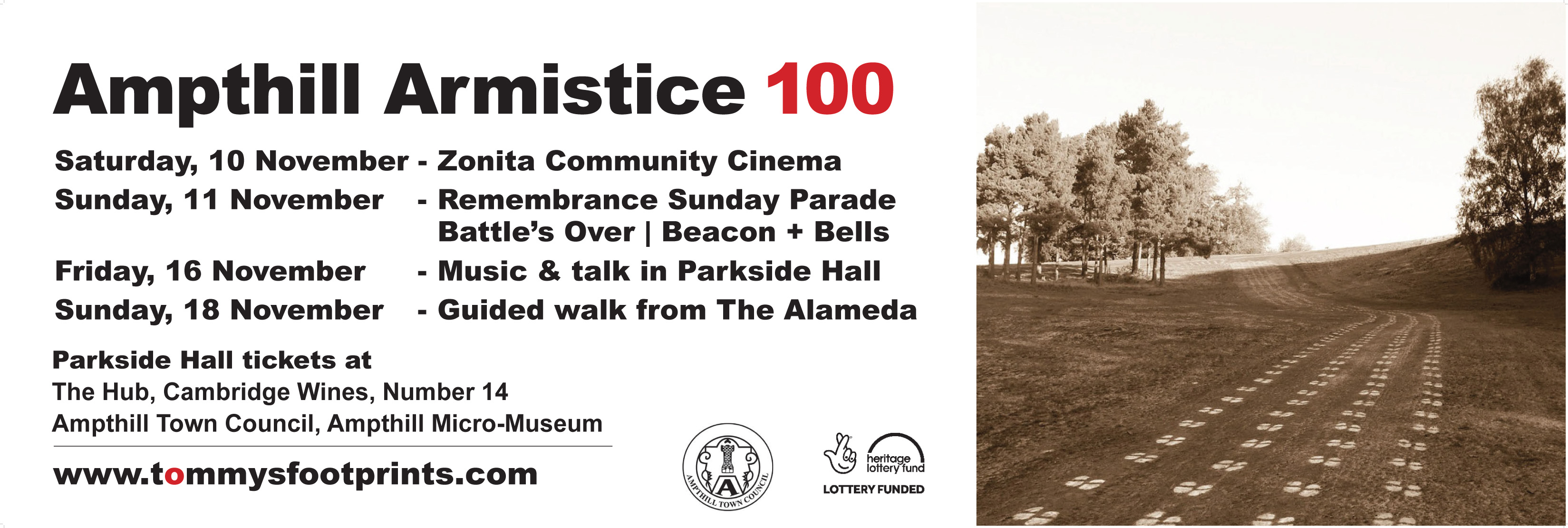
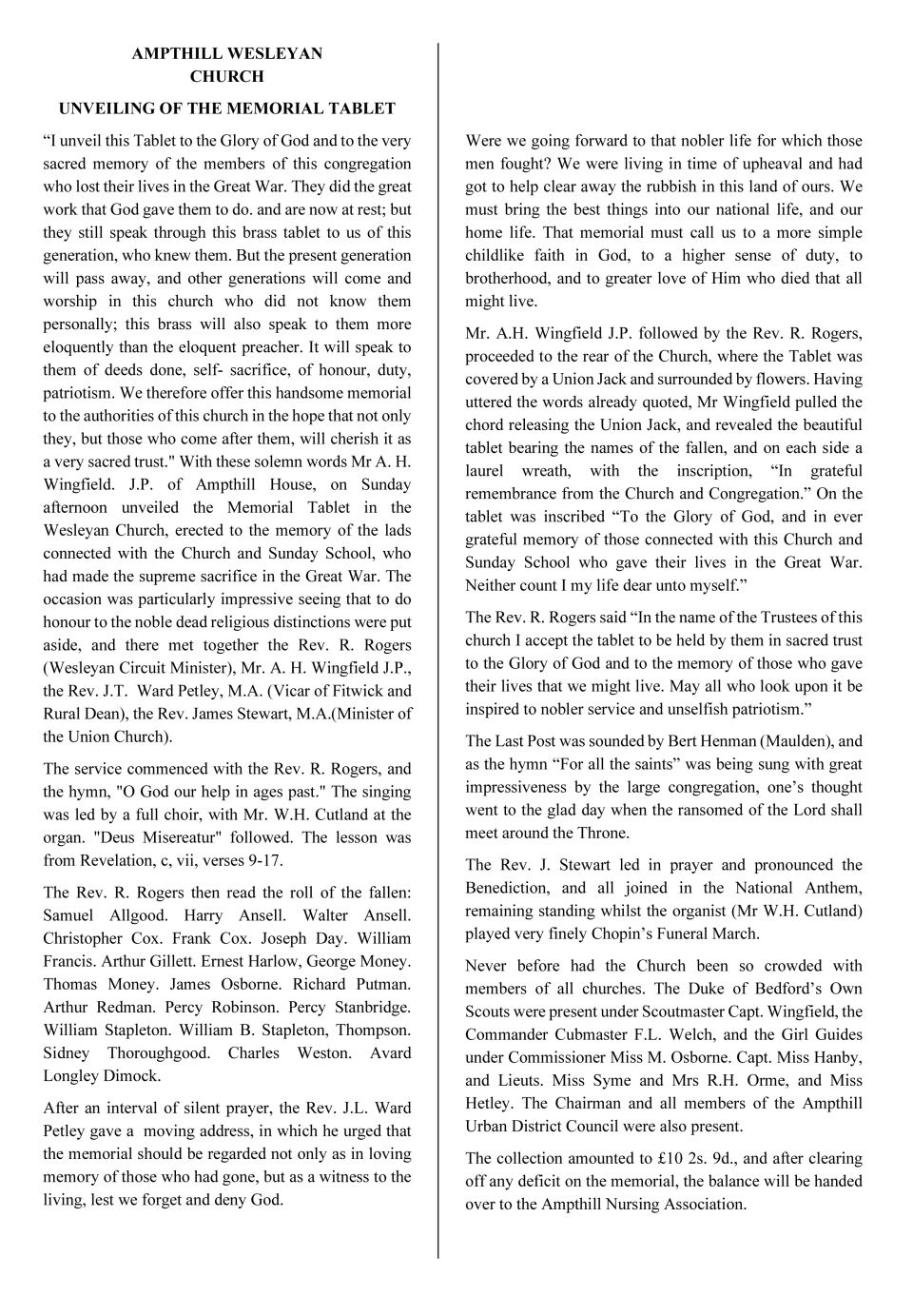
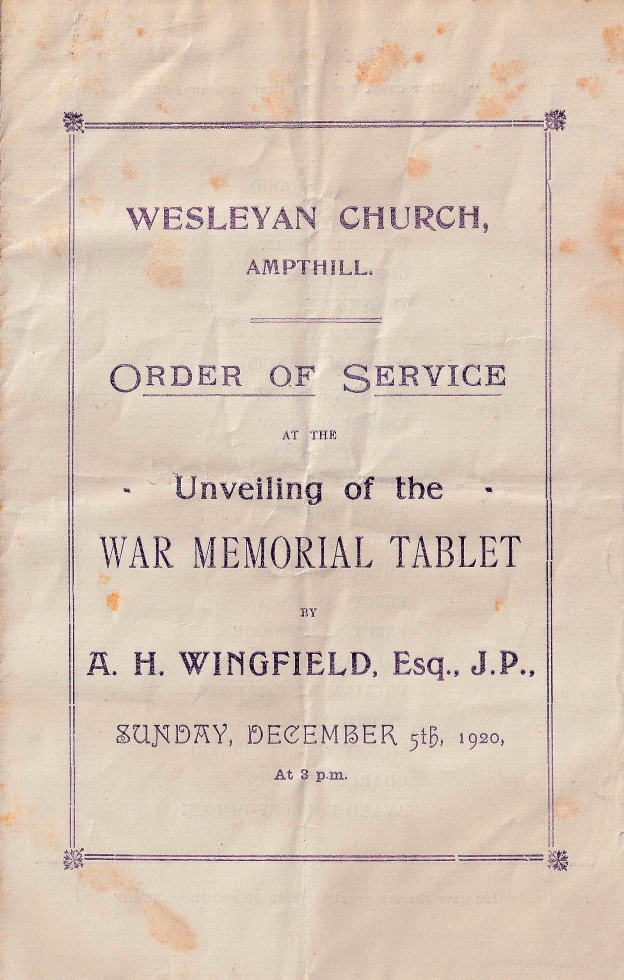



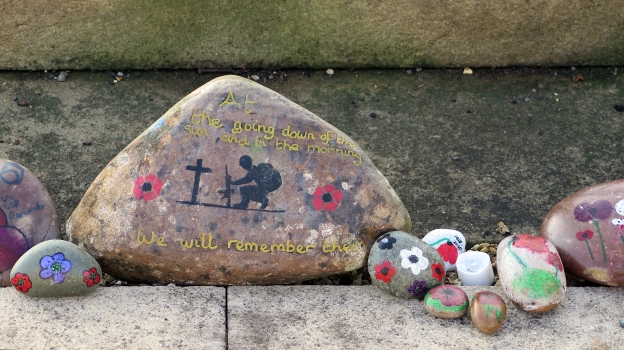

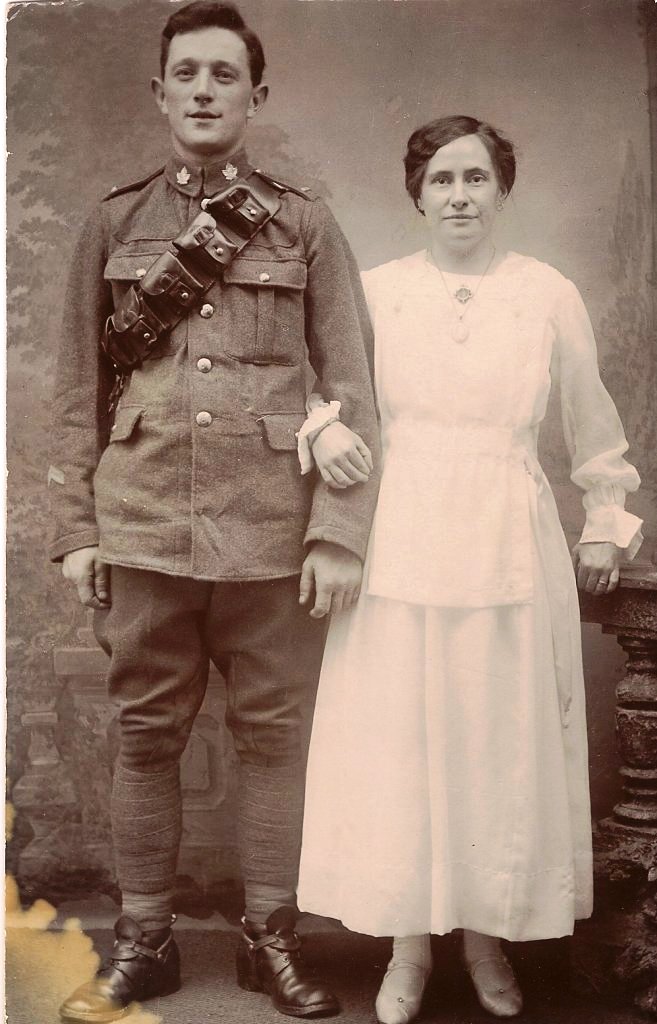 Summer 1918 – the 126th Company moved its operation from Ampthill to Thetford Forest.
On 25th October 1918 Private Dimock was admitted to Thetford Military Hospital. The medical record states
Summer 1918 – the 126th Company moved its operation from Ampthill to Thetford Forest.
On 25th October 1918 Private Dimock was admitted to Thetford Military Hospital. The medical record states
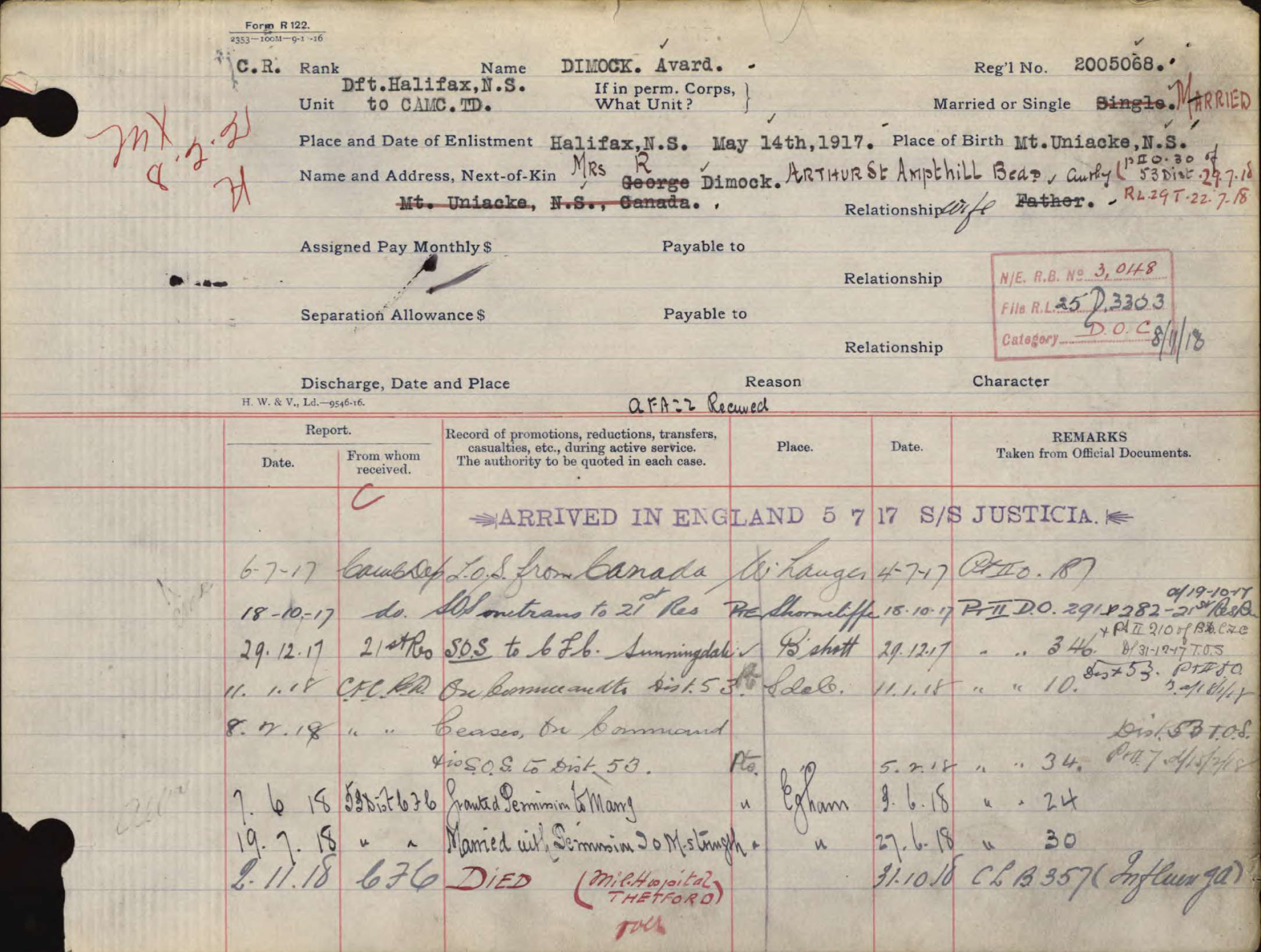 The body of
The body of 

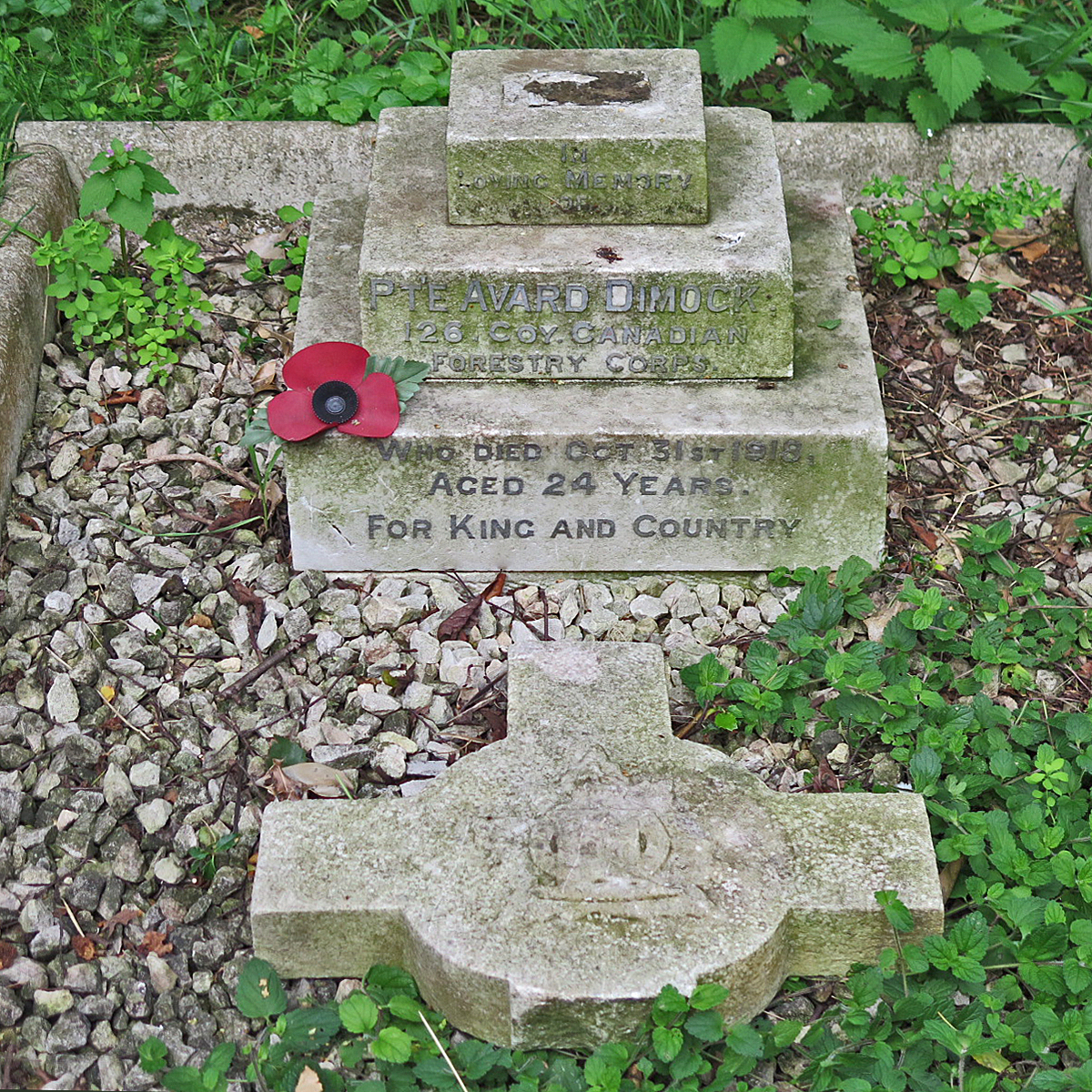 In 2017, as part of the WWI Centenary, Cllr Simon Peacock (Ampthill Mayor) championed repairing the headstone, which Neville Funeral Service generously undertook as a community contribution. The headstone was lifted and restored in time for Remembrance Sunday 2017 when a representative of the Canadian High Commission attended for a service of rededication.
In 2017, as part of the WWI Centenary, Cllr Simon Peacock (Ampthill Mayor) championed repairing the headstone, which Neville Funeral Service generously undertook as a community contribution. The headstone was lifted and restored in time for Remembrance Sunday 2017 when a representative of the Canadian High Commission attended for a service of rededication.
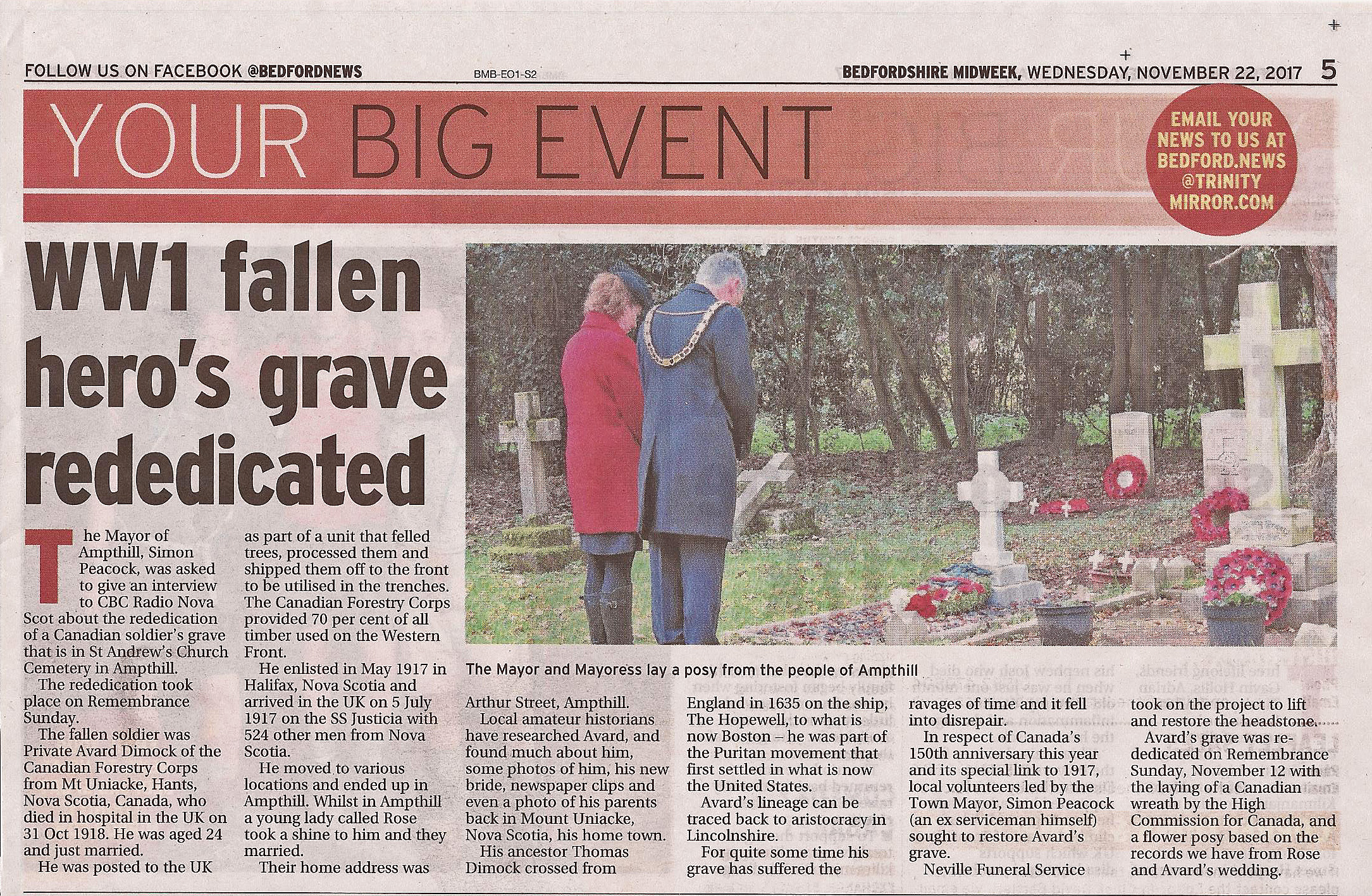 Source:
The Bedfordshire Standard; Bedfordshire Times. The original broadsheet is part of the Bedfordshire & Luton Archive.
Ampthill Parish Magazine
Source:
The Bedfordshire Standard; Bedfordshire Times. The original broadsheet is part of the Bedfordshire & Luton Archive.
Ampthill Parish Magazine
